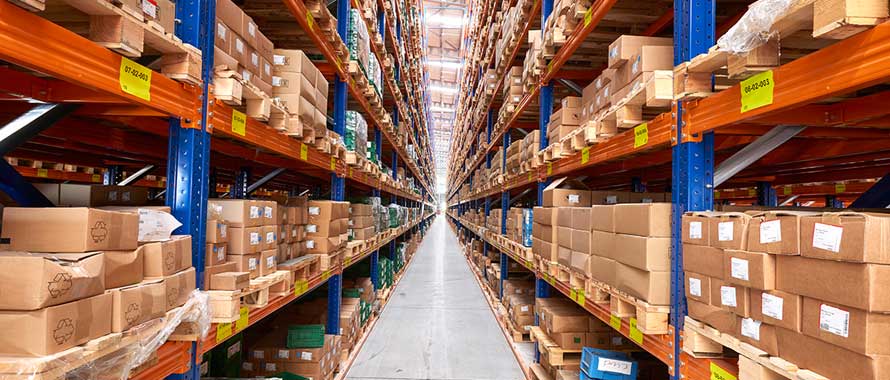The wholesale distribution industry represents $5.6 trillion in annual sales volume.1 Wholesalers are intermediaries who purchase bulk quantities of goods from manufacturers and resell them to retailers at a profit. In this process, wholesalers and distributors take on great risks and need to protect themselves and their products from impending perils.
Brokers and agents can simplify that process by clarifying certain complexities about Distributors and Wholesalers insurance at the onset of a new policy. Bonnie Steen, Vice President & Associate Managing Director, Burns & Wilcox, and Devon Minarik, Managing Director, Burns & Wilcox share insight on the three key factors – product, location, and packaging – brokers should consider when placing Distributors and Wholesalers insurance policies.
Product type matters
“One understanding that it is imperative for a broker to gain at the onset of a new relationship with a distributor or wholesaler is the type of product they are buying and selling,” said Minarik.
“The nature of use and the life expectancy of a product can carry major exposures placing the client at greater risk for a lawsuit,” said Steen.
For example, a warehouse with office supplies would not carry as much of an exposure as would seafood that could spoil in transit or render a consumer ill if not properly handled.
“Many wholesalers and distributors of products, such as refrigerators or water filtration systems, carry additional risks as they often offer installation services,” said Minarik. “If products are improperly installed and cause property damage, then the client could face liability issues as a result.

The nature of use and the life expectancy of a product can carry major exposures placing the client at greater risk for a lawsuit.
Brokers and agents must consider the product from a property standpoint as well.
“If a client distributes electronics, such as mobile devices or televisions, they face a higher risk of falling victim to theft,” said Steen. “However, if they have a warehouse full of paper products, then they face a far different risk, such as losses due to fire or water damage.”
Location, location, location
The location of the facility in which a product is stored or manufactured can potentially indicate additional exposures or even how a policy should be written. Of the top five states with presidential major disaster declarations,1 three of them are listed as top states for distribution centers—Texas, California and Florida.
“Each location’s distinctive climate poses a threat to the inventory and facility through natural disasters such as high winds, floods, tornados, wildfire, or earthquakes,” said Steen. “Distributors and Wholesalers insurance policies can cover certain perils affecting repositories and the inventory they house, making storage location an important part of how the policy is written and the additional coverages that may be needed.”
In the wake of major natural disasters, such as Hurricane Harvey, brokers can assist clients by advising them of high-risk areas and informing them of what the proper policy could do to mitigate any unforeseen losses. With 83 percent of the companies in the wholesale distribution industry considered small business,1 and 25 percent of them not able to reopen after a major storm,2 it is important that they are properly insured.
Location of where the product is manufactured is equally as important as where the warehouse is located. Last year, the United States was the world’s second-largest importer.4 With more than 80 percent of its imports categorized as goods or products,3 a great portion of those imports are products that distributors and wholesalers purchase in order to later sell to retailers.
“If a client’s products are made outside of North America, insurance providers will more than likely write the policy as a manufacturer,” said Steen. “It is extremely difficult to take legal action against an entity outside of the country due to international laws.”
Repackaging and modifying
There are instances where distributors and wholesalers may purchase products to repackage them, for various reasons. The process of opening and repackaging a product increases the exposure to a client significantly and changes the insured status from a wholesaler to a manufacturer, much like country of manufacture does.
“Many distributors and wholesalers have to alter the product that they intend to sell,” said Steen.
For example, if a client is a plumbing distributor, and the pipe they offer needs to be threaded in order to distribute the product, that client’s risk is magnified. By modifying the product in that manner, clients now take on similar risks to that of a manufacturer. Ultimately, anytime a distributor or wholesaler touches the product, they are putting themselves at risk for additional liability.
“Clients carry much less liability insurance if they are simply receiving a product and then shipping it back out directly afterward,” said Minarik.
Steen suggests that brokers take the time to visit a client’s website and search for additional services offered. While they may not be engaging in services currently, installation or assembly services may be offered. Knowing this can adequately prepare brokers for additional risk.
Distributors and Wholesalers insurance submissions vary on a number of factors. While loss history and other general information is important, the factors described above can severely change how a policy is written and responds. Partnering with the right specialty insurer can keep brokers ahead of the knowledge curve and produce better results for their clients.
References:






